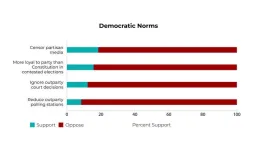Avatar will not lie... or will it? Scientists investigate how often we change our minds in virtual environments
2024-03-18
(Press-News.org)
How confident are you in your judgments and how well can you defend your opinions? Chances are that they will change under the influence of a group of avatars in a virtual environment. Scientists from SWPS University investigated the human tendency to be influenced by the opinions of others, including virtual characters.
We usually conform to the views of others for two reasons. First, we succumb to group pressure and want to gain social acceptance. Second, we lack sufficient knowledge and perceive the group as a source of a better interpretation of the current situation, describes Dr. Konrad Bocian from the Institute of Psychology at SWPS University.
So far, only a few studies have investigated whether moral judgments, or evaluations of another person's behaviour in a given situation, are subject to group pressure. This issue was examined by scientists from SWPS University in collaboration with researchers from the University of Sussex and the University of Kent. The scientists also investigated how views about the behaviour of others changed under the influence of avatar pressure in a virtual environment. A paper on this topic was published in PLOS ONE.
Today, social influence is increasingly as potent in the digital world as in the real world. Therefore, it is necessary to determine how our judgments are shaped in the digital reality, where interactions take place online and some participants are avatars, not real humans, points out Dr. Bocian.
Others know better?
In the first study, the researchers tested the extent to which participants - a total of 103 people - would change their private moral judgments to conform with the judgments of others. First, participants independently judged specific behaviour, such as a woman punishing her child for getting bad grades in school or a man answering the phone and talking loudly in a cinema. Then, participants judged the same behaviours in groups with three other people who responded in a completely different way than the participant did in the first part of the study.
Participants adjusted their opinions to conform with others in 43% cases. However, they did it less often when the judgments concerned situations in which other people were harmed, describes Dr. Konrad Bocian.
Under pressure of avatars
The second study repeated the experiment with 138 participants in a virtual environment. Each participant first judged the behaviour of other people in a given situation, and then - after putting on a VR headset - did it again in the presence of three avatars in a virtual environment.
Some of the avatars were allegedly controlled by humans, the remaining avatars were AI-controlled. In the latter case, participants were told the Kent School of Engineering and Digital Arts wanted to run tests on their new three algorithms, which were implemented in the virtual avatars.
It turned out that participants changed their judgments to align them with judgments of human-controlled avatars in 30% cases, and in 26 percent cases when avatars were controlled by AI. The results suggest that judgments about moral behaviour, like other judgments we make, are subject to pressure from both real and virtual groups, comments Dr. Bocian.
Researchers emphasise that further research is needed to determine the extent to which groups can influence the judgments of others in a digital setting, and in particular the social consequences of such influence in the era of rapid growth of digital communication, which may soon move to different metaverses.
Group pressure to influence private moral judgments of individuals in a virtual world can be used for both good and malicious purposes. This is why understanding the mechanisms of this influence is so important. Only with in-depth knowledge can we increase the awareness of virtual world participants about the influence that others can have on them, the researcher concludes.
END
ELSE PRESS RELEASES FROM THIS DATE:
2024-03-18
Research Highlights:
A study of over 20,000 adults found that those who followed an 8-hour time-restricted eating schedule, a type of intermittent fasting, had a 91% higher risk of death from cardiovascular disease.
People with heart disease or cancer also had an increased risk of cardiovascular death.
Compared with a standard schedule of eating across 12-16 hours per day, limiting food intake to less than 8 hours per day was not associated with living longer.
Embargoed until 3 p.m. CT/4 p.m. ET, Monday, March 18, 2024
CHICAGO, March 18, 2024 — An analysis ...
2024-03-18
Blue Carbon projects are expanding globally; however, demand for credits outweighs the available credits for purchase.
Currently, only three types of wetlands are considered Blue Carbon ecosystems: mangroves, saltmarsh and seagrass.
However, other tidal wetlands also comply with the characteristics of what is considered Blue Carbon, such as tidal freshwater wetlands, transitional forests and brackish marshes.
In a new study, scientists from Australia, Indonesia, Singapore, South Africa, Vietnam, the US and Mexico have highlighted the increasing opportunities for Blue Carbon projects for the conservation, restoration and improved management of highly threatened ...
2024-03-18
EMBARGOED UNTIL MARCH 18 AT 3 P.M. EST
Recently, fundamental tenets of democracy have come under threat, from attempts to overturn the 2020 election to mass closures of polling places.
A new study from the Polarization Research Lab, a collaboration among researchers at the Annenberg School for Communication at the University of Pennsylvania, Dartmouth College, and Stanford University, has found that despite this surge in anti-democratic behavior by U.S. politicians, the majority of Americans oppose anti-democratic attitudes and reject partisan violence.
From September 2022 to October 2023, a period which included the 2022 midterm ...
2024-03-18
VANCOUVER, Wash. -- Some soil bacteria can acquire sets of genes that enable them to pump the heavy metal nickel out of their systems, a study has found. This enables the bacteria to not only thrive in otherwise toxic soils but help plants grow there as well.
A Washington State University-led research team pinpointed a set of genes in wild soil bacteria that allows them to do this in serpentine soils which have naturally high concentrations of toxic nickel. The genetic discovery, detailed in the journal Proceedings of the National Academies ...
2024-03-18
Heparin, the world’s most widely used blood thinner, is used during procedures ranging from kidney dialysis to open heart surgery. Currently, heparin is derived from pig intestines, but scientists at Rensselaer Polytechnic Institute have discovered how to make it in the lab. They have also developed a path to a biomanufacturing process that could potentially revolutionize how the world gets its supply of this crucial medicine.
“In recent years, with disease and contamination issues disrupting the global supply chain of pig heparin and potentially putting millions of patients at risk, it’s clear we need to diversify ...
2024-03-18
Berkeley — A network of artificial streams is teaching scientists how California’s mountain waterways — and the ecosystems that depend on them — may be impacted by a warmer, drier climate.
Over the next century, climate change is projected to bring less snowfall to the Sierra Nevada. Smaller snowpacks, paired with warmer conditions, will shift the annual snowmelt earlier into the year, leaving less water to feed streams and rivers during the hot summer months. By 2100, mountain streams are predicted to reach their annual base, or “low-flow,” conditions an average of six ...
2024-03-18
“The impact of wind turbines on house prices is much smaller than generally feared: In the U.S., it’s about one percent for a house that has at least one wind turbine in a 10 km radius”, explains Maximilian Auffhammer, a Professor in the Department of Agricultural and Resource Economics at the University of California, Berkeley and co-author of the study. “And what really surprised me is that the house value bounces back to the original price over the years.” The study authors also found that there was no longer any ...
2024-03-18
UNDER EMBARGO UNTIL MARCH 18, 2024 AT 3:00 PM U.S. EASTERN TIME
Renewable energy sources are essential for transitioning towards a decarbonized energy system and making the electricity grid more environmentally sustainable. Clean energy alternatives like wind power can effectively replace fossil fuels, contributing to reduced air pollution and slow down climate change.
Wind power has emerged as the fastest-growing non-hydro renewable energy source worldwide. However, the implementation of wind energy infrastructure, including windmills, faces significant challenges. One major obstacle is the opposition from local communities.
Wind turbines, the primary ...
2024-03-18
Farmers rely on pesticides to control agricultural pests. But insects often develop resistance to the toxins in pesticides. University of Maryland researchers have developed and successfully tested a strategy for using genomics to monitor for and identify emerging resistance to specific toxins early, well before it becomes a widespread problem. The work will enable farmers to mitigate resistance and prolong the effectiveness of pest management tools.
The research was published on March 18, 2024, in the Proceedings of ...
2024-03-18
UNIVERSITY PARK, Pa. — Leafhoppers, a common backyard insect, secrete and coat themselves in tiny mysterious particles that could provide both the inspiration and the instructions for next-generation technology, according to a new study led by Penn State researchers. In a first, the team precisely replicated the complex geometry of these particles, called brochosomes, and elucidated a better understanding of how they absorb both visible and ultraviolet light.
This could allow the development of bioinspired optical materials with possible applications ranging from invisible cloaking devices to coatings to more efficiently harvest ...
LAST 30 PRESS RELEASES:
[Press-News.org] Avatar will not lie... or will it? Scientists investigate how often we change our minds in virtual environments



